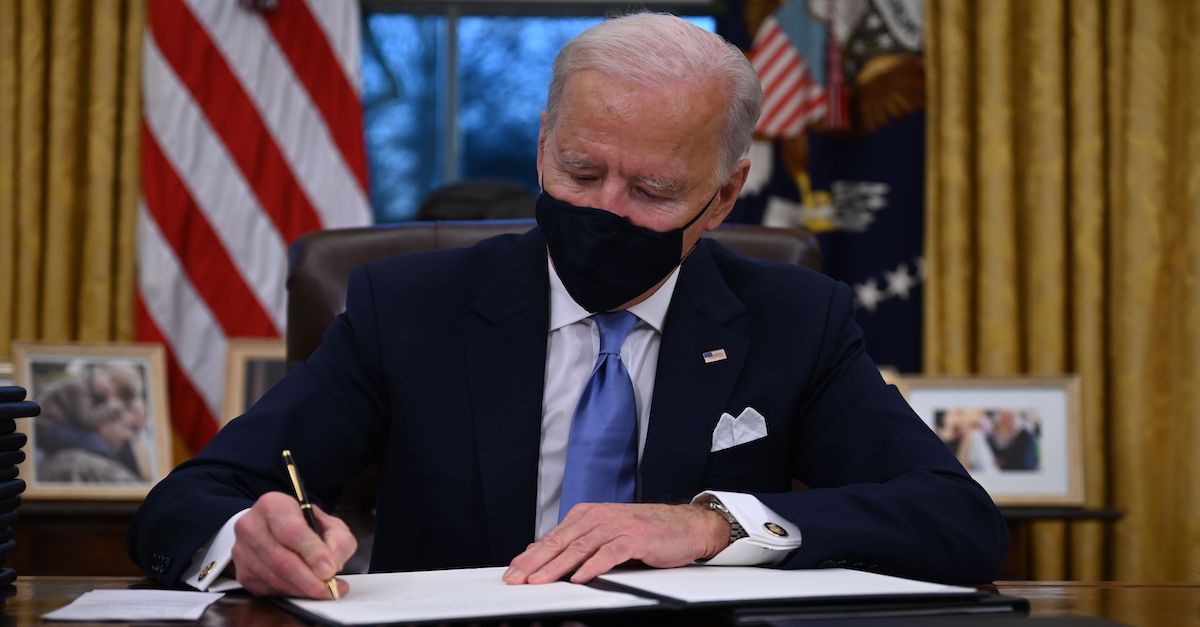
US President Joe Biden sits in the Oval Office as he signs a series of orders at the White House in Washington, DC, after being sworn in at the US Capitol on January 20, 2021. (Photo by JIM WATSON/AFP via Getty Images)
The Supreme Court has denied a request from Louisiana to block a White House policy establishing a task force that analyzes the so-called “social costs” of greenhouse gas emissions when considering new federal regulations.
In a brief order issued Thursday, the justices denied Louisiana’s request to reinstate a U.S. District Court’s ruling that blocked President Joe Biden‘s administration from using the cost estimates to inform the federal agencies’ decision-making process.
“The application to vacate stay presented to Justice Alito and by him referred to the Court is denied,” the order said. No dissents were noted, and no written opinion was issued.
The case stems from an executive order that Biden signed on his first day in office reinstating a Barack Obama-era program calling for several federal agencies to determine the “social costs” of three types of emissions: carbon, nitrous oxide, and methane.
Biden’s executive order established the Interagency Working Group on the Social Cost of Greenhouse Gases. The “social costs” of greenhouse cases estimate the “monetized damages associated with incremental increases in greenhouse gas emissions,” the order explained. The analysis considers changes in “agricultural productivity, human health, property damage from increased flood risk, and the value of ecosystem services.”
“It is essential that agencies capture the full costs of greenhouse gas emissions as accurately as possible, including by taking global damages into account,” Biden said in the executive order. “Doing so facilitates sound decision-making, recognizes the breadth of climate impacts, and supports the international leadership of the United States on climate issues.”
An accurate social cost determination is necessary in order to accurately determine the “social benefits of reducing greenhouse gas emissions when conducting cost-benefit analyses of regulatory and other actions,” the executive order said.
Louisiana and nine other states—Kentucky, Alabama, Florida, Georgia, Mississippi, South Dakota, Texas, West Virginia, and Wyoming—challenged the policy in a lawsuit filed in April of 2021.
In February, U.S. District Judge James D. Cain Jr., a Donald Trump appointee, issued an injunction blocking implementation of the policy. The Fifth Circuit—widely considered to be the most conservative of the U.S. Circuit courts—reversed Cain, allowing the policy to take effect.
On appeal to the Supreme Court, the states argued that the Biden administration’s use of the social cost estimates is nothing more than a “power grab designed to manipulate America’s entire federal regulatory apparatus through speculative costs and benefits.”
The states, all of which have Republican governors or attorneys general, accused the Biden administration of looking to “impose its preferred policy outcomes on every sector of the American economy.”
The Biden administration maintained that the executive order was a proper use of executive power, consistent with the Constitution.
“Article II of the Constitution empowers the President to supervise subordinate executive officers in the exercise of their statutory duties,” Solicitor General Elizabeth Prelogar argued, noting that several constitutional clauses “make clear that the President may exercise ‘general administrative control’ over the Executive Branch.”
“By requiring the agencies to use a standardized set of values for the social cost of greenhouse gases, he ‘secure[d] that unitary and uniform execution of the laws which Article II of the Constitution evidently contemplated in vesting general executive power in the President alone,'” Prelogar noted.
[Image via Jim Watson/AFP via Getty Images.]